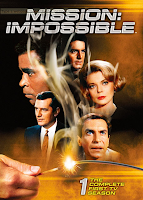In the last few days I have been taking breaks from editing a piece by watching old episodes of the classic TV series Mission: Impossible. The premise, for the few readers who are unfamiliar with it, is that a special team of spies receives an assignment, usually involving a foreign nation (depose a dictator, release a political prisoner, unfix the elections), which they execute using disguise, technology, and sophisticated understanding of the internal politics of their adversary. With no support from official American law enforcement or the Department of State, they operate in the shadows.
I’ve been trying to think what about this is so soothing and appealing to me, beyond the sophistication of the plan, the assumed credibility of the technology, and Lalo Schiffrin‘s excellent soundtrack, and I think I’ve got it. It evokes a feeling of nostalgia for a past that never was; a past in which good and evil are clearly delineated in the opening sequence, and in which our secret service works for the undisputed good while we all sleep soundly in our beds. A past in which power is never abused, but tempered with talent and an old-fashioned gentlemanly code. A past in which the United States is a benevolent patriarch, deftly and subtly governing its childlike counterparts. A past in which women and people of color play cameo roles in the world of secret service, and women are praised and utilized for their sexual appeal without complain or critique.
The problem is that this past never existed. In the late sixties, when this show aired on American television, the US was already angling toward a questionable and destructive elective war in Vietnam, and was already involved in fixing (not unfixing!) the elections in various foreign countries, not to mention the ones it was yet to fix. Involvement in attempted and successful assassinations of foreign politicians and dignitaries has been, since then, clearly documented. And let’s not even start discussing foreign military interventions.
How comforting it was to live in the Mission: Impossible world, in which these developments could be either disbelieved or explained away as benevolent and necessary. Which just makes the courage of people like Daniel Ellsberg, who actually saw what was what and brought it into the realm of public consciousness, all the more impressive.
And then something very important has dawned on me. Many of us still live in that world. Much of the police brutality and correctional abuse of power that has been going on in the last four decades has occurred precisely because we still want to hold on to the belief that government agents, domestic or international, are at the forefront of keeping us safe, would never do anything unnecessary, and can always put disinterested, neutral professionalism and patriotism ahead of self interest.
In that respect, there is little difference between international and domestic security. If we’re willing to give a carte-blanche to our special agents abroad, we’ll also extend this courtesy to agents at home who present their work as “the toughest beat.”We’ll disbelieve the possibility that people might be getting shot because of their race and because of unchecked, biased assumptions, because it’s inconvenient to think so. Because if we start doubting our police force, and our correctional staff, we’ll have to stop sleeping soundly in our beds, and realize that many things – not only in far-away countries – have gone horribly awry.


No comment yet, add your voice below!